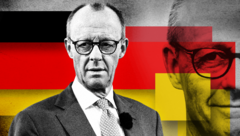**Friedrich Merz, a prominent figure within Germany's Christian Democratic Union (CDU), is navigating a complex political landscape, characterized by controversial alliances with far-right factions as he vies for leadership.**
**Friedrich Merz: The Controversial Conservative Front-Runner for Germany’s Leadership**

**Friedrich Merz: The Controversial Conservative Front-Runner for Germany’s Leadership**
**The CDU's potential future leader may shift the party's dynamics with bold rhetoric and strategic alliances as elections approach.**
Friedrich Merz stands on the brink of potentially leading Germany, positioned as a controversial figure whose policies reflect a dramatic pivot for the Christian Democratic Union (CDU). Critically viewed by some as a risk-taker who has attempted to engage the far-right Alternative für Deutschland (AfD) to support his calls for stricter immigration laws, Merz's leadership ambitions are underscored by a controversial history and a distinctive political style.
At 69, Merz's journey has seen him rise from political obscurity, having been sidelined previously by former Chancellor Angela Merkel. His resurgence in this election cycle has been marked by a clear departure from the centrist principles that characterized Merkel's leadership. Despite an unsuccessful bid to legislate tougher migration measures, his invocation of far-right support has sparked protests and sharp criticism from moderates and even from Merkel herself.
Raised in a conservative Catholic family, Merz has remained ambitious throughout his career—first as a young MEP in the European Parliament before transitioning to Germany's Bundestag. His tenure in politics has been interspersed with a successful corporate career, making him a millionaire before his return to the CDU's fold.
Yet, as he prepares for a federal election following the collapse of Chancellor Olaf Scholz's government, Merz faces skepticism regarding his collaborative tactics with the AfD. Detractors argue that such alliances may endanger the trust necessary for potential coalition partners, as fears mount over his tactics potentially empowering a far-right agenda he publicly disavows.
Merz's personal life adds depth to his political persona: a devoted husband and father, his marriage to judge Charlotte Merz has garnered sympathy amid criticisms targeting his character. He maintains that their partnership exemplifies mutual support, challenging narratives that portray him unfavorably, especially among women and younger voters.
As polls show CDU leading ahead of the elections, all eyes remain on Merz to see if he can consolidate his support base while managing the precarious balance of far-right flirtation and maintaining moderate alliances. The urgency for decisive leadership is palpable, especially in the EU, where there’s a collective hope for resolution to Germany's political stalemate. Observers across the spectrum are watching closely—will Merz strengthen the CDU's position, or will his controversial maneuvers backfire in the critical lead-up to the elections?






















